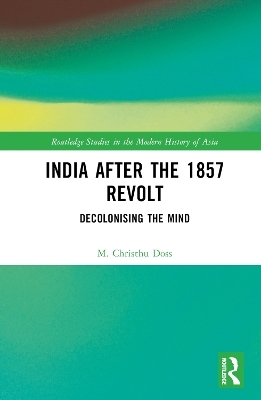
India after the 1857 Revolt
Routledge (Verlag)
978-1-032-34922-0 (ISBN)
Weaving together the varied and complex strands of anti-colonial nationalism into one compact narrative, Christhu Doss takes an incisive look at the deeper and wider historical process of decolonization in India.
In India after the 1857 Revolt, Doss brings together some of the most cutting-edge thoughts by challenging the cultural project of colonialism and critically examining the multi-dimensional aspects of decolonization during and after the 1857 revolt. He demonstrates that the deep-rooted popular discontent among the Indian masses followed by the revolt generated a distinctive form of decolonization movement—redemptive nationalism that challenged both the supremacy of the British Raj and the cultural imperatives of the controversial proselytizing missionary agencies. Doss argues that the quests for decolonization (of mind) that got triggered by the revolt were further intensified by the Indocentric national education; the historic Chicago discourse of Swami Vivekananda; the nonviolent anti-colonial struggles of Mahatma Gandhi; the seditious political activism displayed by the Western Gandhian missionary satyagrahis; and the de-Westernization endeavours of the sandwiched Indian Christian nationalists.
A compelling read for historians, political scientists and sociologists, it is refreshingly an indispensable guide to all those who are interested in anticolonial struggles and decolonization movements worldwide.
M. Christhu Doss received his primary education from Tirunelveli Diocesan Trust Association (T.D.T.A.) Primary School (Kalungadi, Tirunelveli District, Tamil Nadu, India), secondary education from Sankar Reddiyar Government Higher Secondary School (Nanguneri, Tirunelveli District), graduation from St. John’s College (Palayamkottai, Tamil Nadu), post-graduation from Manonmaniam Sundaranar University (Tirunelveli) and Doctorate programme from the Centre for Historical Studies, Jawaharlal Nehru University (New Delhi, India). He teaches history at Christ University, Bengaluru, India. His areas of academic research interest include modern South Asian history with a special focus on social, cultural and intellectual history of modern and contemporary India.
Foreword
Preface
Acknowledgements
List of Abbreviations
1 Introduction: Colonialism, Culture and Decolonization
Locating the Roots of Culture and Nationalism in India
Culture, Power and Decolonization
Orientalists and Utilitarians: Black and White Divisions
Colonialism as a ‘Civilizing’ Mission
‘Messengers’ of Modernity
Revisionists and Rewriting of History
Dialogues, Negotiations and Contestations
Charter Act of 1813 and after
Decolonizing the Mind during and after 1857
Redemptive Nationalism: Mahatma Gandhi, Europeans and Americans
Subaltern Masses and Decolonization
Chapterization
2 First War of Indian Independence, Cultural Sensibilities and Roots of Decolonization
Fighting the Firangis
Expanding the Horizons of ‘Moral Conquest’
1857 Revolt and the Issue of ‘Cultural Contamination’
Cultural Sensitivities and Decolonization
3 Education, Forms of Knowledge and Trajectories of Decolonization
Contesting Cultural Imperialism
‘Moral Effects’ of English Education: Orientalists and Anglicists
Controversial Colonial Pedagogy
Education in Transition
Education, Knowledge and Power
National Education, Cultural Consciousness and Decolonization
Awakening Indians from Their ‘Deep Slumber’
4 From ‘Civilizing’ Mission to Decolonization: European Gandhian Satyagrahis in India
Nonviolence, Sedition and Declaration of Guilt
Making of Gandhian Satyagrahis
Politics and Passive Resistance
Friends of India
Confronting Colonial Ideologies: Ideal Satyagrahis
5 American Gandhians and Nonviolent Redemptive Nationalism in India
Pacifists and Decolonization
Contesting the Claims of European Supremacy
Expanding the Horizons of Decolonization
Nonviolent Crusade against the Colonial Highhandedness
American Gandhians and Redemptive Nationalism
6 Sandwiched Patriots, De-Westernization and Struggle for Independence
Nationalist Christians and Anti-Colonial Sentiments
Indianization/Hinduization of Missionary Religion
Ashrams and Churchless Christianity
Sandwiched Patriots
Christian Nationalists and Their Fault Lines
De-Westernization and Struggle for Independence
Concluding Observations
Bibliography
Index
| Erscheinungsdatum | 07.11.2022 |
|---|---|
| Reihe/Serie | Routledge Studies in the Modern History of Asia |
| Verlagsort | London |
| Sprache | englisch |
| Maße | 156 x 234 mm |
| Gewicht | 630 g |
| Themenwelt | Geschichte ► Allgemeine Geschichte ► Neuzeit (bis 1918) |
| Geisteswissenschaften ► Geschichte ► Regional- / Ländergeschichte | |
| Geschichte ► Teilgebiete der Geschichte ► Wirtschaftsgeschichte | |
| Naturwissenschaften ► Geowissenschaften ► Geografie / Kartografie | |
| Sozialwissenschaften ► Soziologie ► Spezielle Soziologien | |
| ISBN-10 | 1-032-34922-0 / 1032349220 |
| ISBN-13 | 978-1-032-34922-0 / 9781032349220 |
| Zustand | Neuware |
| Haben Sie eine Frage zum Produkt? |
aus dem Bereich


